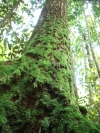 The Sarawak government intends to convert one million hectares of land into oil palm plantations within the next ten years. Most of this land is currently covered by secondary rainforests, yet it also includes fruit and rubber gardens as well as hitherto untouched primary rainforests, including peatland swamp forests.
The Sarawak government intends to convert one million hectares of land into oil palm plantations within the next ten years. Most of this land is currently covered by secondary rainforests, yet it also includes fruit and rubber gardens as well as hitherto untouched primary rainforests, including peatland swamp forests.
According to Bruno Manser Fonds, Sarawak's Land Development Minister, James Masing said that the government needed to look into a "more aggressive" conversion of native lands into oil palm plantations. He said that the state government intended to double its oil palm plantation area from the current 920,000 hectares to 2 million hectares by 2020, and stated that his ministry had requested funds from the Malaysian federal government for this purpose.
Masing's announcement comes as a shock to human rights and environmental campaigners who are increasingly concerned about the ruthless alienation of native lands and the rapid degradation of Sarawak's rainforests, one of the most biodiverse habitats in the world. Last year, Malaysia's indigenous organizations called for a moratorium on the development of new plantations due to the blatant disregard of native rights by the state authorities.
Sarawak's failure to enforce its forest legislation policies and its unlawful handling of the native rights issue have recently caused the European Union to stall timber trade talks with Malaysia over a Voluntary Partnership Agreement (VPA).
While the state's logging policies have been controversial for more than two decades, the root cause seems to be the massive corruption under Sarawak's Chief Minister, Abdul Taib Mahmud, who has been in power since 1981.


